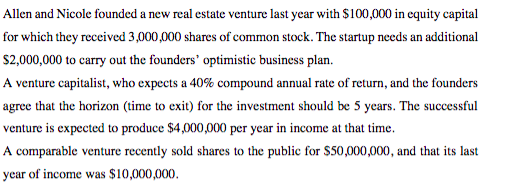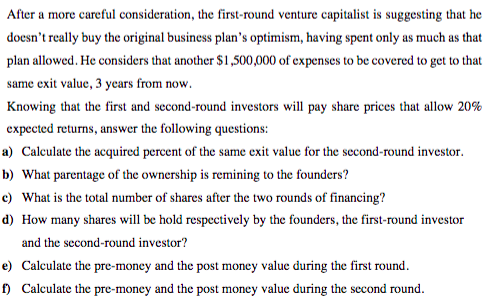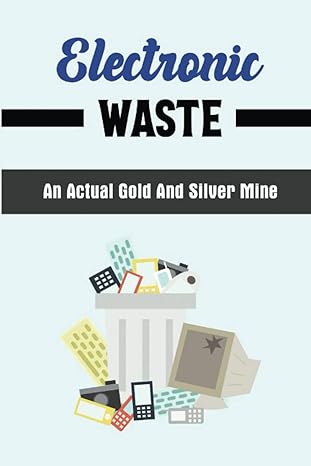

Allen and Nicole founded a new real estate venture last year with $100,000 in equity capital for which they received 3,000,000 shares of common stock. The startup needs an additional $2,000,000 to carry out the founders' optimistic business plan. A venture capitalist, who expects a 40% compound annual rate of return, and the founders agree that the horizon (time to exit) for the investment should be 5 years. The successful venture is expected to produce $4,000,000 per year in income at that time. A comparable venture recently sold shares to the public for $50,000,000, and that its last year of income was $10,000,000 After a more careful consideration, the first-round venture capitalist is suggesting that he doesn't really buy the original business plan's optimism, having spent only as much as that plan allowed. He considers that another $1,500,000 of expenses to be covered to get to that same exit value, 3 years from now. Knowing that the first and second-round investors will pay share prices that allow 20% expected returns, answer the following questions: a) Calculate the acquired percent of the same exit value for the second-round investor. b) What parentage of the ownership is remining to the founders? c) What is the total number of shares after the two rounds of financing? d) How many shares will be hold respectively by the founders, the first-round investor and the second-round investor? e) Calculate the pre-money and the post money value during the first round. 1) Calculate the pre-money and the post money value during the second round. Allen and Nicole founded a new real estate venture last year with $100,000 in equity capital for which they received 3,000,000 shares of common stock. The startup needs an additional $2,000,000 to carry out the founders' optimistic business plan. A venture capitalist, who expects a 40% compound annual rate of return, and the founders agree that the horizon (time to exit) for the investment should be 5 years. The successful venture is expected to produce $4,000,000 per year in income at that time. A comparable venture recently sold shares to the public for $50,000,000, and that its last year of income was $10,000,000 After a more careful consideration, the first-round venture capitalist is suggesting that he doesn't really buy the original business plan's optimism, having spent only as much as that plan allowed. He considers that another $1,500,000 of expenses to be covered to get to that same exit value, 3 years from now. Knowing that the first and second-round investors will pay share prices that allow 20% expected returns, answer the following questions: a) Calculate the acquired percent of the same exit value for the second-round investor. b) What parentage of the ownership is remining to the founders? c) What is the total number of shares after the two rounds of financing? d) How many shares will be hold respectively by the founders, the first-round investor and the second-round investor? e) Calculate the pre-money and the post money value during the first round. 1) Calculate the pre-money and the post money value during the second round








